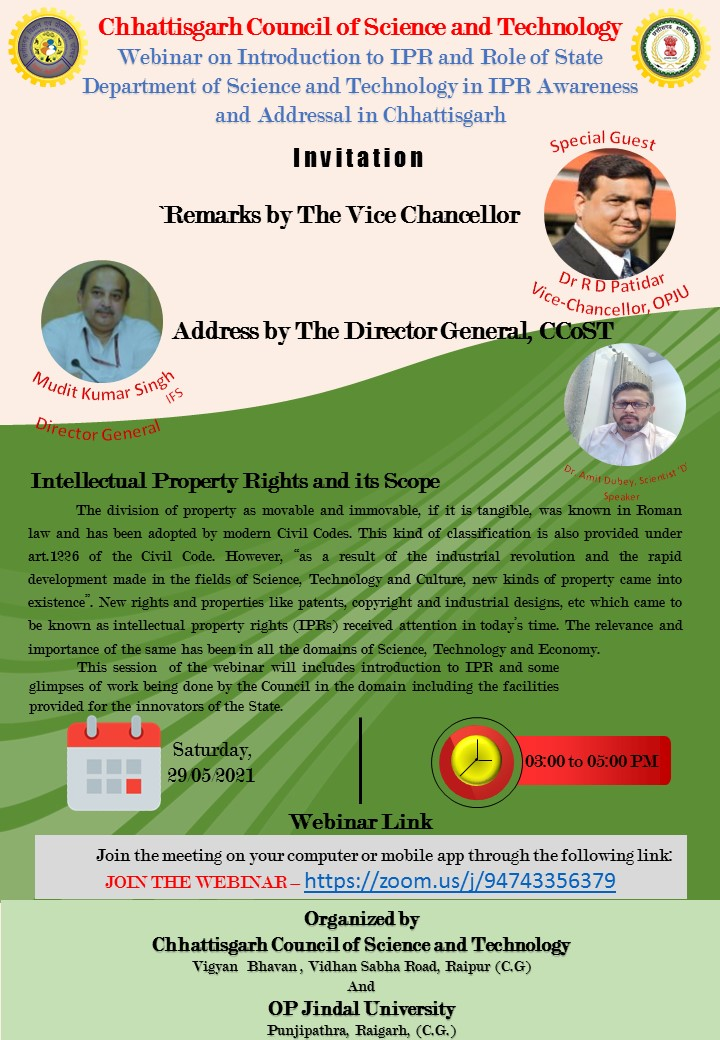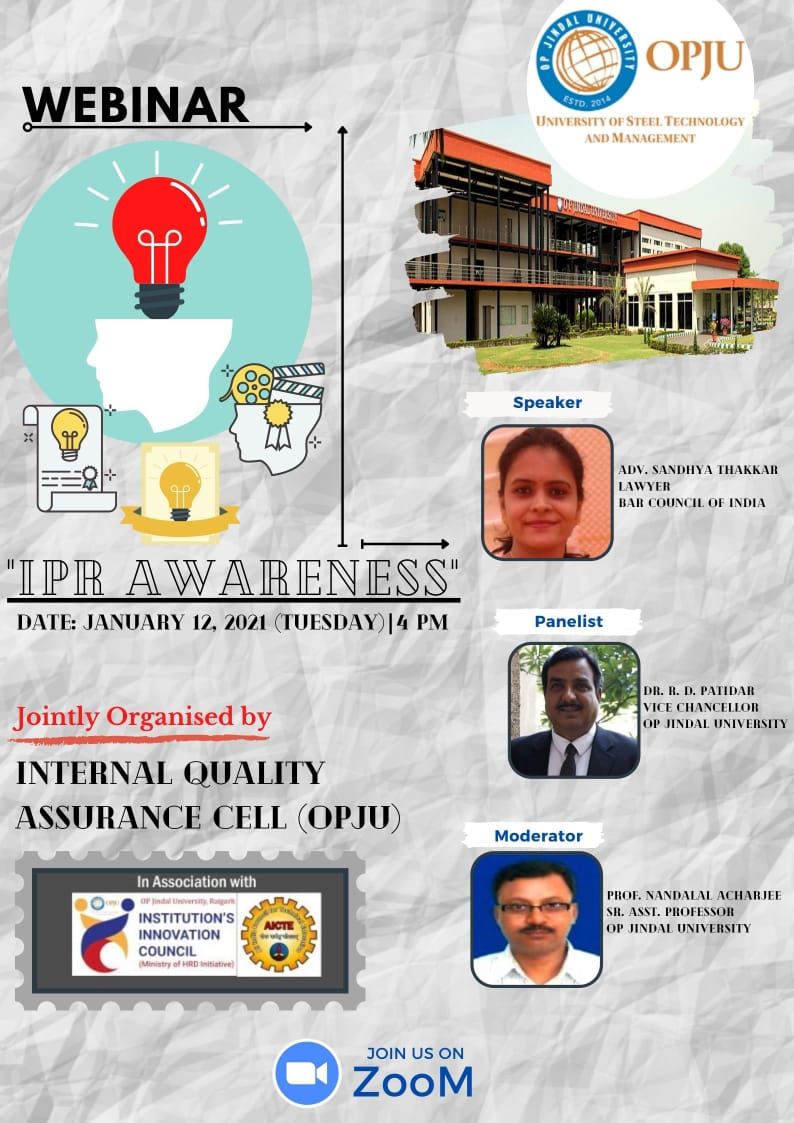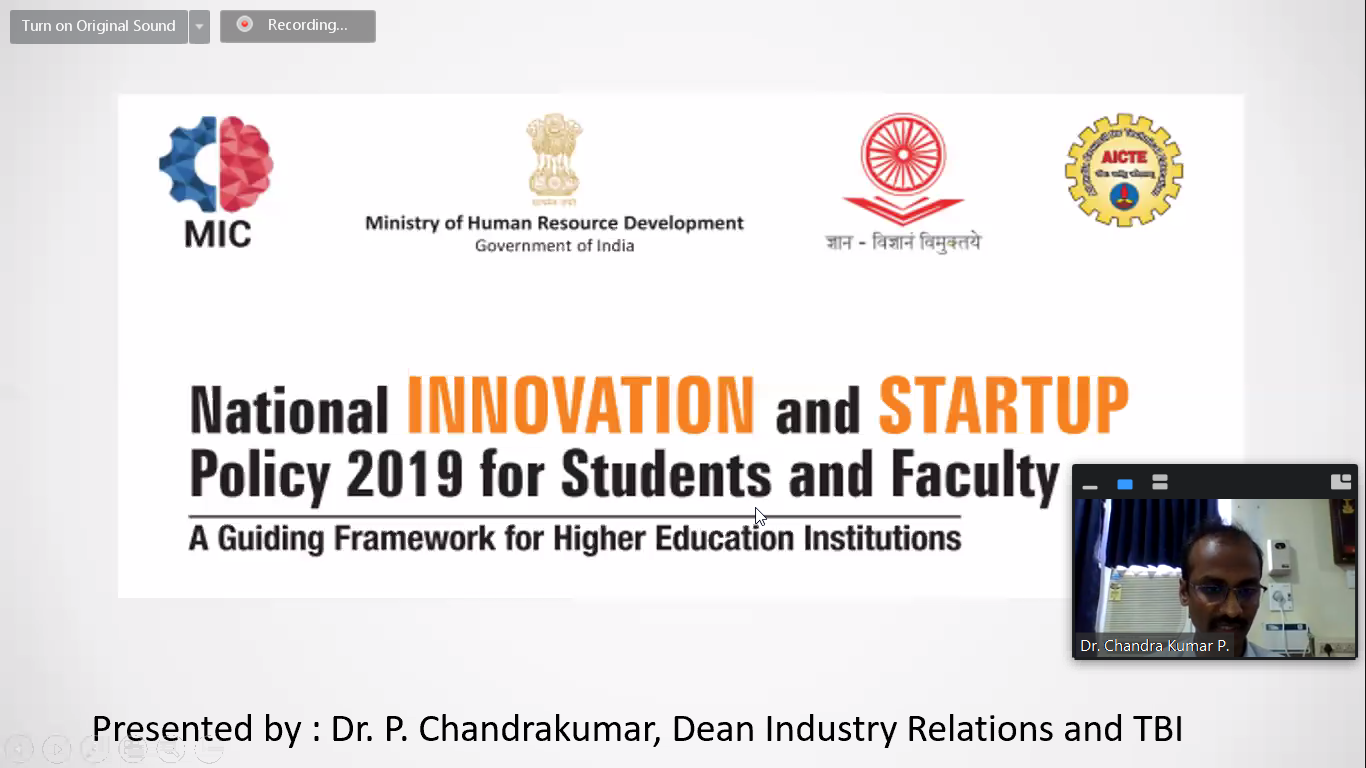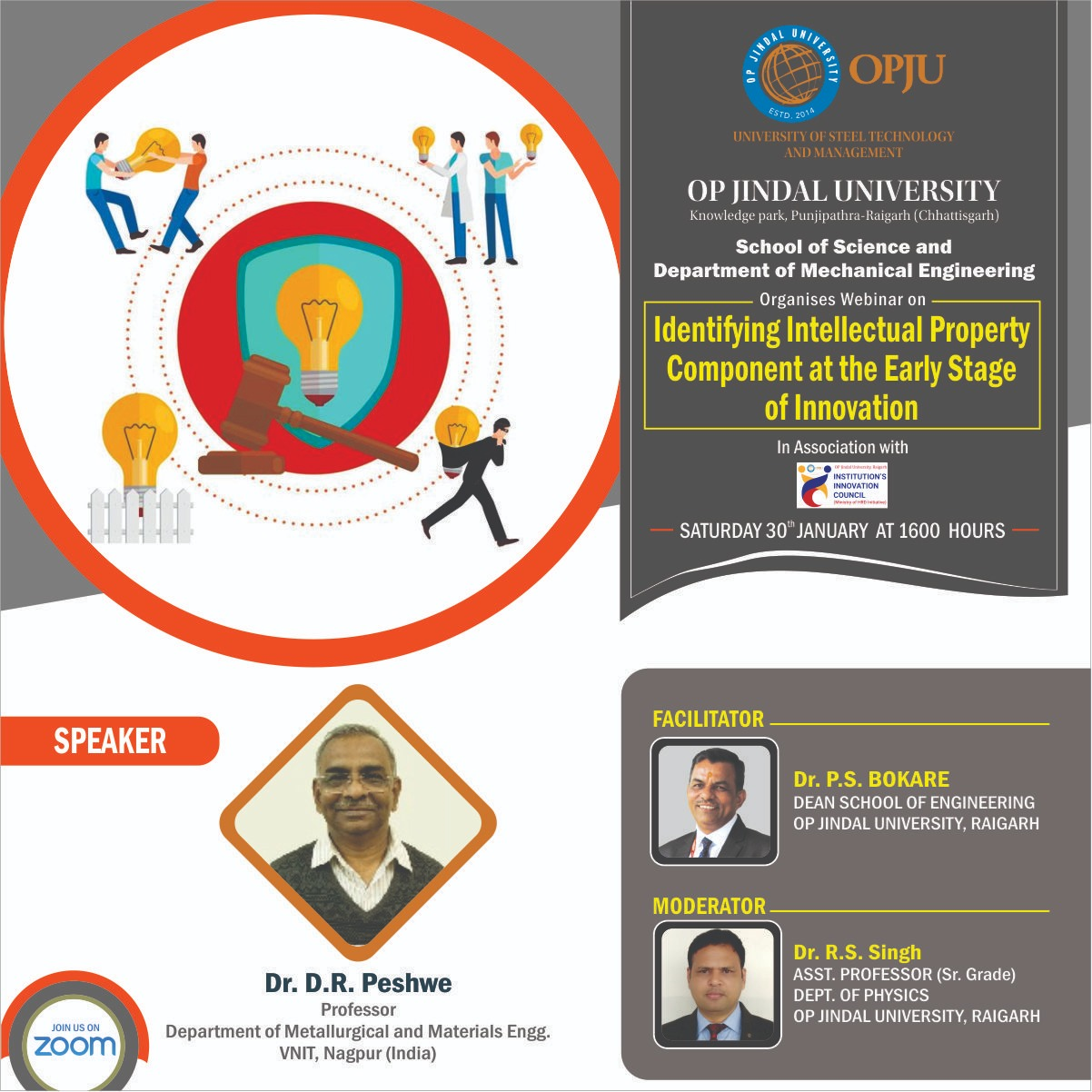

MIC will focus on creating complete ecosystem which will foster the culture of Innovation across all educational institutions from ideas generation to pre-incubation, incubation and graduating from the incubator as successful start-ups. MIC will also work on designing ranking system to identify institutions in the forefront of innovation.OP Jindal University's Intellectual Property Rights Cell (IPR) cell is actively fulfilling its obligation and commitment. The key objective of this cell to boost up the University productivity in terms of creating intellectual possessions through the Research & Development. Till date, the cell has filed more than twenty patents in the field of Medical Physics, Solar cells, Biotechnology, Pharmacology, Textiles, and Electronics, organizes various IPR related activities.
Intellectual Property Rights is an inevitable tool for today’s globalized economy. Fostering innovation is one of the sustainable development goals set by the Government of India. “An India where Intellectual Property stimulates creativity and innovation for the benefit of all” is the vision of our National IPR Policy. Several initiatives have already proven to foster innovation like the Make in India, Start up India, Digital India and Skill India. The Atal Innovation Mission nurtures the innovative energies across the country in schools and universities. Under the IPR policy, the cell for IPR Promotion and Management, OPJU IPR cell has been asked to facilitate creation and commercialization of IP assets in collaboration with the Office of the Controller General of Patents, Designs and Trademarks.
IPR Cell of OP Jindal University provides a platform for all the students, researchers, faculties, and and industrialists to interact and discuss various breakthroughs, bottlenecks and recent developments in the area of research with particular relevance to creating, managing and monetization of the IP Assets IPR Cell at OPJU has been continuously reiterating the importance of intellectual property rights and the economy of early-stage business and also in established economies in the University scenario.
To create an awareness about IPR among students and faculties.
To conduct workshops/seminar/training courses on IPR.
To promote better understanding of IPR and to identify more IPs.
To provide training on future activities regarding IPR filing processes.
To implement university IPR policy at the campus.
Dissemination of knowledge, information and awareness on IPR to different needy sections of the society.
Consultancy/projects on patenting of technologies.
A common set of objects of the UG, PG and PhD level choice based interdisciplinary courses is to make the students aware of the relevant community level intellectual property.
1. Center of Research Excellence (CRE) & IIC OPJU in Association with CGCOST (Chhattisgarh Council of Science and Technology) organized a webinar on topic titled “INTELLECTUAL PROPERTY RIGHTS AND ITS SCOPE” on May 29th, 2021 (Saturday) 15:00 hrs (03:00 PM onwards). Speaker: Dr. Amit Dubey Scientist 'D' and Incharge, CLF and IPRC Chhattisgarh Council of Science and Technology

2. The Internal Quality Assurance Cell (IQAC) and IIC OPJU Raigarh Chhattisgarh, is organized one webinar on January 12, 2021, 04:00 pm entitled “AWARENESS IN IPR”. Speaker: ADVOCATE SANDHYA THAKKAR (MANIYAR) LLM (AUSTRALIA)

3. OP Jindal University- Institution Innovation Council (IIC) in association with the Ministry of Education’s Innovation Cell (MIC) has completed a session on “ORIENTATION SESSION ON NISP & IPR” on Jan. 07, 2021 16:00 India Speaker: Dr. P. Chandrakumar, Associate Professor, Dept. of Mechanical Engineering, Dean Industry Relations and TBI, Vel-Tech Rangarajan Dr. Sagunthala R&D Institute of Science and Technology, Avadi, Chennai – 600 062

4. Webinar on “IDENTIFYING INTELLECTUAL PROPERTY COMPONENT AT THE EARLY STAGE OF INNOVATION” in association with IIC OPJU has been conducted on Jan 30, 2021 16:00 India. Speaker: Dr. D. R. Peshwe, Professor, Dept. of Metallurgical & Materials Engineering, VNIT Nagpur.


A Patent is a statutory right for an invention granted for a limited period of time to the patentee by the Government, in exchange of full disclosure of his invention for excluding others, from making, using, selling, importing the patented product or process for producing that product for those purposes without his consent.
Patent protection is territorial right and therefore it is effective only within the territory of India. However, filing an application in India enables the applicant to file a corresponding application for same invention in convention countries, within or before expiry of twelve months from the filing date in India. Therefore, separate patents should be obtained in each country where the applicant requires protection of his invention in those countries. There is no patent valid worldwide.
It is possible to file an international application known as PCT application in India in the Patent Offices located at Kolkata, Chennai, Mumbai and Delhi. All these offices act as Receiving Office (RO) for International application. The addresses of these offices are available on the website of CGPDTM i.e. www.ipindia.nic.in.
An invention relating either to a product or process that is new, involving inventive step and capable of industrial application can be patented. However, it must not fall into the categories of inventions that are non-patentable under section 3 and 4 of the Act.
A patent application can be filed either by true and first inventor or his assignee, either alone or jointly with any other person. However, legal representative of any deceased person can also make an application for patent.
A patent application can be filed with Indian Patent Office either with complete specification or with provisional specification along with fee as prescribed in schedule I. In case the application is filled with provisional specification, then one has to file complete specification within 12 months from the date of filing of the application. There is no extension of time to file complete specification after expiry of said period.
From 20th July, 2007 the Indian Patent Office has put in place an online filing system for patent application. More information for filing online application is available on the website of Patent Office i.e. www.ipindia.nic.in. This facility is also available for filing trademarks application.
An invention to become patentable subject matter must meet the following criteria - i) It should be novel. ii) It should have inventive step or it must be non-obvious iii) It should be capable of Industrial application. iv) It should not fall within the provisions of section 3 and 4 of the Patents Act 1970.
The application for patent should be filed before the publication of the invention and till then it should not be disclosed or published. Disclosure of invention by publication before filing of the patent application may be detrimental to novelty of the invention as it may no longer be considered novel due to such publication. However, under certain conditions, there is grace period of 12 months for filing application even after publication.
 |  |
| Dr. Sandeep Biswal, Assistant Professor | Dr Satish Kanhed, Assistant Professor |
| Department of Electrical Engg | Department of Mechanical Engg |
| sandeep.biswal@opju.ac.in, 9179339691 | satish.kanhed@opju.ac.in, 7828419250 |